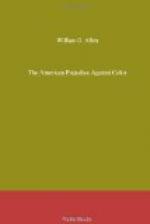The following paragraph of a letter written to me by Miss King a few days after I left her in December, amused me much,—it may possibly amuse the reader:—
“Professor,—You would smile if you only knew what an excitement your visit here caused among the good people of Fulton. Some would have it that we were married, and others said if we were not already married, they were sure that we would be; for they knew that you would not have spent a whole week with us if there had been no love existing between you and myself. Some of the villagers came to see me the day after you left, and begged of me, if I were determined to marry you, to do so at once, and not to keep the public in so much suspense.”
Friend, have you ever heard or read of anything which came nearer to clapping the climax of the ridiculous than this most singular appeal couched in the last clause of this quotation, to the benevolence of Miss King? Certainly, if anything could have come nearer, it would have been the act of a certain lady who, having heard during this selfsame visit that we were to be married on the morrow, actually had her sleigh drawn up to the door, and would have driven off to the Elder’s to “stop the wedding” had not her husband remonstrated. It is true, this lady opposed the marriage, not on the ground of an immorality, but of its inexpediency considering the existent state of American sentiment; but then it is curious to think of what amazing powers she must have imagined herself possessed.
Public opposition however, soon began to assume a more decided form. Neighbours far and near, began to visit the house of Elder King, and to adopt such remonstrance and expostulation as, in their view the state of the case demanded. Some thought our marriage would be dreadful, a most inconceivably horrid outrage. Some declared it would be vulgar, and had rather see every child of theirs dead and buried, than take the course which, they were shocked to find, Miss King seemed bent to do. Some sillier than all the rest, avowed that should the marriage be permitted to take place, it would be a sin against Almighty God; and it may be, they thought it would call down thunder-bolts from the chamber of heaven’s wrath, to smite us from the earth.
“There is no peace,” saith my God, “to the wicked.”—And surely, clearer exemplifications of this saying of Holy Writ were never had, than in the brain-teasings, mind-torturings and heart-rackings of these precious people, out of deference to our welfare. May they be mercifully remembered and gloriously rewarded.
It is proper to introduce to the reader at this point, our cherished friends,—Mr. and Mrs. Porter,—and to say at once, that words are not expressive enough to describe the gratitude we owe them, nor in what remembrance we hold them in the deepest depths of our hearts. They stood by us throughout that season of intended bloody persecution, turning neither to the right nor the left, nor counting their own interests or lives as aught in comparison to the friendship they bore us, or to their love of the principles of truth, justice and humanity. Amid the raging billows, they stood as a rock to which to cling.




